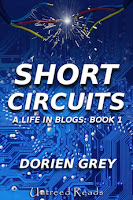Walt Whitman’s classic poem demonstrates how one human has the ability to sound notes within others, and enable them to identify completely with the message. Such words are comforting proof that each of us is part of a whole. We all have favorite books with which we identify, sometimes without recognizing exactly which specific chords in them resonate most strongly. But it is poems and song lyrics which, by the very nature of their compactness, have a uniquely and directly powerful ability to encapsulate our own, deep-down outlooks, attitudes and core beliefs. Given that most of us are far more often exposed to songs than to poetry, I’m quite sure that each of us can point to at the lyrics of at least one song—probably several—and say “this is me.”
This past weekend, I went to see a production of Cabaret, which I had never before seen on stage. It was an example of the whole being greater than the sum of its parts in that while some of the cast members had good voices, they played the part of their character rather than being the character and therefore the spark of magic which makes some productions magical was missing. But there is no question about the power of songs which comprise the show.
All of which is a roundabout way of getting to the point that I’ve always been able to lay out my entire interior makeup in the words of a few songs. One song in Cabaret—“Maybe This Time”—has always grabbed me by the heart and described my sense of longing as well as if not better than I could ever do myself. (Turn on your mental stereo and listen to it carefully. You’re hearing me—and perhaps, if you do not have someone to share your life, yourself.)
With all the emotional rigidity of a blade of grass, I am frequently moved by songs, and believe I did a blog on them before at one time. But after “Maybe This Time” reentered my head, where, as is my wont it has stubbornly remained ever since, I decided to select three song lyrics which, even if you knew absolutely nothing about me as a person, would paint a trompe l’oeil self-portrait.
I chose three because while one could be a sketch, a portrait is seldom done in one color. So I selected “Maybe This Time,” to perfectly mirror my life-long search for romantic love, which I still have hopes, however unrealistically, to this day.
While my being gay is not the only thing that defines me as a human being, it has been a preeminent influence, and my entire life has been colored by it. My attitudes toward—and defiance of—bigotry and stupidity and those who would dictate how others should live their lives were formed and have evolved from it. Hence, the second of my three defining songs: “I Am What I Am,” from Jerry Herman’s La Cage aux Folles. To me, it defines the word “pride.”
And the third song...the one which encapsulates my view of everything I aspire to and know I shall never fully realize, is “The Impossible Dream,” from The Man of La Mancha. Can you possibly imagine what the world could be like if everyone “strove, with his last ounce of courage, to reach the unreachable stars”? I can.
I note that the underlying theme of all these songs, and the underlying theme of my existence, is, as noted in my reasons for choosing “Maybe This Time,” hope. With hope, anything is possible, any star eventually reachable. Without it, there is nothing.
So there you have it. I am what I am, and I cling to the impossible dream in hopes that maybe this time....
-----------
This blog is from Dorien's ebook of blogs, Short Circuits, available from UntreedReads and Amazon; it's also available as an audio book from Amazon/Audible.com:



















